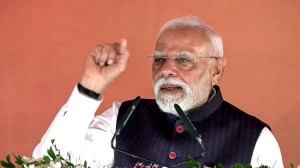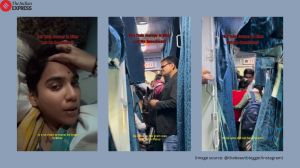The house with the closed doors
It's one of the most thankless jobsthat can be assigned to a policeman in Karachi: guarding the IndianConsulate General or India House as ...

It’s one of the most thankless jobsthat can be assigned to a policeman in Karachi: guarding the IndianConsulate General or India House as it’s better known. What once was abeacon of India in the heart of Pakistan is now a pale shadow of its formerself. India House remains padlocked with one solitary policeman at its maingate. Power supply to the place has been cut and the cop has to light up alantern at night.
The number of people who would queue up outside the house, located on theposh Fatima Jinnah Road, for visas has dropped drastically. Gone too are theagents who would help them process their applications and the inevitablesleuths who hounded the applicants.
The auditorium next to the main building which once hosted some of thegreats in music and art has been boarded up. The Consulate General, a hugebuilding which housed offices and residential quarters for lower levelstaff, is now home to hundreds of crows, rats, dogs and alley cats, besidesthe odd drug addict.
Officials from the Indian High Commission in Islamabad who pay occasionalvisits to Indian properties in Karachi claim that several of the building’sfixture and fittings have been stolen. A senior Indian diplomat said theteak doors and windows have been prised out, as have the lights andsanitaryware.
In an equally poor condition are the set of apartment blocks owned by theIndian government located in the plush Clifton area and the residence of theIndian Consul-General, which is housed in Old Clifton, near the residence offormer prime minister Zulfikar Ali Bhutto.
Ever since the Indian Consulate General closed down in Karachi in 1995 afterthe city witnessed severe disturbances, hundreds of visa seekers have had totravel to the Indian High Commission in Islamabad. At one point in time, theIndian Consulate General would issue over 700 visas a day with a servicethat allowed visa applicants to submit their passports by afternoon and pickup their passports by evening.
Now, there are two ways to get an Indian visa. The more ardous one is totrudge to Islamabad, stand in line for a token and then wait a few more daysto have a visa issued. That, after being harassed at the visa gate bysleuths, or after actually paying for a place in the queue or being harassedby officials.
The Islamabad police too harass the visa-seekers, many of whom camp outsidethe commission since they cannot afford to live in the motels of the priceyIslamabad. Local police officials pick up many of these temporary squattersfor “behaving in a suspicious manner” since the Indian mission is locatedin the high security diplomatic enclave.
The other way to get a visa is to go through some resourceful travel agentswho charge anything between Rs 5,000 to Rs 20,000 per visa. Of late, rateshave shot up after a businessman of the Bohri community, whose memberstravel very frequently to India, got entangled with the government over hislittle “visa business”. The most trusted agent to approach, he would getover 50-100 visas issued on one single day. The Indian High Commission staffhad also arrived at some sort of an understanding with him, but his luck ranout and one of his staff members was nabbed by intelligence officials forcarrying hundreds of Pakistani passports from Islamabad to Karachi withoutproper authorisation.
These days, there’s a new problem at hand: Indian Airlines is unable to finda suitable office to work out of. After operating out of an office in thecity centre which was in a state of disrepair, the Indian Airlines shiftedto a better premises on the main Shahrae Faisal boulevard in Karachi, onlyto be asked to vacate soon after since it was located too close to militaryoffices. Now the Indian Airlines is operating out of the Karachi Airport, anarrangement that suits no one since the airport is about 15 kilometers outof the city. Perhaps, it’s a sign of the times.





- 015 hours ago
- 0214 hours ago
- 0314 hours ago
- 0414 hours ago
- 0514 hours ago


























